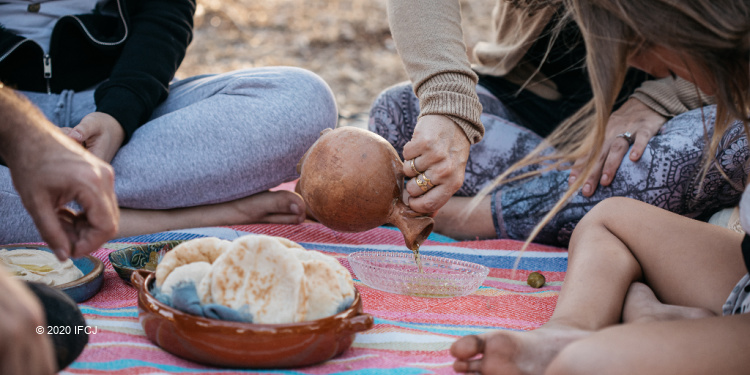Anointed to Defeat Darkness
Yael Eckstein | December 21, 2022

Command the Israelites to bring you clear oil of pressed olives for the light so that the lamps may be kept burning. —Exodus 27:20
This month, my family and I will join Jews around the world in celebrating Hanukkah, the Festival of Lights. Enjoy this collection of my devotional teachings on this festival that Jesus celebrated (John 10:22) and explore the many lessons of faith that this observance has for Christians and Jews alike
Hanukkah, like every Jewish festival, has its special traditional foods. And for Hanukkah, the special foods all revolve around oil. For Jews from European backgrounds like myself, the main traditional food is potato latkes.
Latkes basically are potato pancakes deep-fried in oil. Most people I know eat them with apple sauce or sour cream. For Sephardic Jews — those from North African or Middle Eastern backgrounds — the food of the season is called sufganiyot, jelly-filled donuts deep-fried in oil.
Here in Israel, where the majority of Jews are Sephardic, these delicious jelly donuts are everywhere at this time of year. Personally, I try not to eat too many!
Oil is connected to Hanukkah not only because the Maccabees lit the candles with the pure olive oil in the Temple after winning a war. Olive oil also plays an important role throughout the Bible and is a central symbol of the Jewish people as one of the seven species of Israel.
Anointed to Defeat Darkness
Although nowadays we think of olive oil as something we use in cooking or in salad dressing, the primary use of olive oil in biblical times was for light, including for the lamp in the Temple. We read in the Book of Exodus, “Command the Israelites to bring you clear oil of pressed olives for the light so that the lamps may be kept burning.”
The Jewish sages point out that the only way to extract oil from olives is by crushing the olives. Similarly, the Jewish people’s mission to be light to the world can only come about through our suffering and oppression over the centuries.
Maybe this is why Paul compared the Jewish people, of all things, to an olive tree, of all things: “…you though a wild olive shoot, have been grafted in among the others and now share in the nourishing sap from the olive root…” (Romans 11:17).
A second common use of olive oil that we see in the Bible in addition to light, is for anointing. In perhaps one of the most well-known and beloved psalms, we read, “You prepare a table before me in the presence of my enemies. You anoint my head with oil; my cup overflows” (Psalm 23:5).
The reason that kings, princes, and temple priests were anointed with olive oil specifically was because olive oil represents light. To be anointed means to be empowered to defeat darkness and to bring the light of God to others. And defeating darkness is what Hanukkah is all about.
Your Turn:
What has God anointed you to do? What of your experiences enables you to be the light to those around you?
